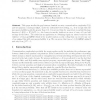Free Online Productivity Tools
i2Speak
i2Symbol
i2OCR
iTex2Img
iWeb2Print
iWeb2Shot
i2Type
iPdf2Split
iPdf2Merge
i2Bopomofo
i2Arabic
i2Style
i2Image
i2PDF
iLatex2Rtf
Sci2ools
116
click to vote
ICALP
2007
Springer
2007
Springer
Unbounded-Error One-Way Classical and Quantum Communication Complexity
This paper studies the gap between classical one-way communication complexity C(f) and its quantum counterpart Q(f), under the unbounded-error setting, i.e., it is enough that the success probability is strictly greater than 1/2. It is proved that for any (total or partial) Boolean function f, Q(f) = C(f)/2 , i.e., the former is exactly (without an error of even ±1) one half as large as the latter. The result has an application to obtaining (again an exact) bound for the existence of (m, n, p)-QRAC which is the n-qubit random access coding that can recover any one of m original bits with success probability ≥ p. We can prove that (m, n, > 1/2)-QRAC exists if
Boolean Function F | Classical One-way Communication | ICALP 2007 | Success Probability | Theoretical Computer Science |
Related Content
| Added | 08 Jun 2010 |
| Updated | 08 Jun 2010 |
| Type | Conference |
| Year | 2007 |
| Where | ICALP |
| Authors | Kazuo Iwama, Harumichi Nishimura, Rudy Raymond, Shigeru Yamashita |
Comments (0)

